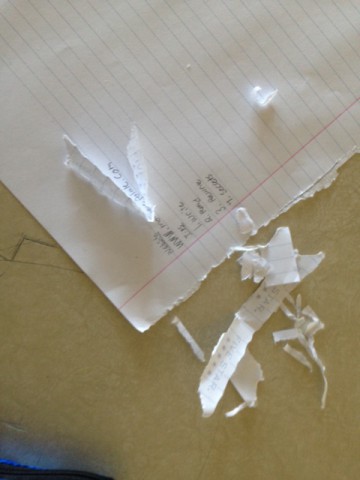Wouldn't YOU read a book called Isaak, the Human Shredder? I came up with that title today at Centennial Academy where I met a 10th grade student who was doing something I had never seen a student do before -- not in my 32 years in the classroom! Isaak was shredding the side of his sheet of paper. I happened to be explaining to his class how writers need to OBSERVE INTERESTING STUFF TO INCLUDE IN THEIR BOOKS -- and well, Isaak turned out to be interesting. Hey, Isaak, I'm busy writing a few books right now, so how about YOU write that book instead of me?!
I visited FIVE classes today at Centennial, but because the school is known for its small class sizes, I think I got a chance to get to know the kids -- and they're fun and open-hearted. I started the day with Miss McNaughton's Grade 11 class and I was explaining how TROUBLE IS THE FUEL THAT MOVES A STORY FORWARD. I happened to lock eyes at that moment with a student named Sarah and I asked her whether she could see in my eyes that I'd tasted trouble. Sarah said yes, and then I told her that I saw from her eyes that she'd tasted trouble too. As I explained to Sarah and her classmates, understanding what trouble feels like (or tastes like, smells like, sounds like, or looks like) has helped make me a writer.
My next two classes happened to be boys only. When I asked Miss Byron's Grade 7 class if they liked being in a class with all boys, a student named Justin cracked me up with his answer. He said: "It's the best. There's no drama that way." Later, a student named Jean-Philippe shared a story that gave me GOOSEBUMPS. (I always get goosebumps when I hear something touching or beautiful). The story was about how this summer, Jean-Philippe got to hang out in the toolshed that once belonged to his great uncle who died. Jean-Philippe, something tells me you need to write a story set in that toolshed. And a student named Luke understood what I meant when I explained that many of my novels for kids are rooted in reality. "You mean you use a story you know with a new sheet of paint?" -- and then Luke corrected what he'd just said, turning it into, "You mean you use a story you know with a new coat of paint?" I LOVED THAT because Luke was demonstrating out loud something else that writers need to do: REWRITE!
Alexandre, a student in Miss Byron's Grade 8 class (also boys only), asked about the editing process. He wanted to know what my editor's main criticism was when she first read What World Is Left. I thought that was a really sophisticated question. I explained how my editor felt I was protecting Anneke, the character whom I based on my mom. My editor, Sarah Harvey, thought the book would be better if Anneke was angrier with her father. That turned out be great advice.
When I visited Miss Markies's Grade 10 class, I spoke to the students about doing research and how sometimes, grandparents have the best stories -- and how it's up to grandchildren to find those stories out. A student named Emily had a great suggestion. She said that looking at old photographs is a good way to get people talking about their pasts. Emily got the idea because recently she was visiting her grandmother's cottage -- and they looked at old photographs together.
I ended my day with another one of Miss Byron's Grade 7 classes. I warned them not to be too cute or too smart because I already had a lot of good material for today's blog -- but they didn't listen! Several students in this class are already hooked on writing. Zachary told us, "I write for hours. Sometimes my wrist hurts." And towards the end of my visit, Zachary said something else I could not resist writing down: "Whenever you go some place, you never know what people have been through." What beautiful words to use to end today's blog entry. You know what I think? That we can use language and stories to share what we have been through, and to learn about others' experiences as well. Thanks to all my friends at Centennial for a great day. I'll be back on Friday. And I already look forward to it!
